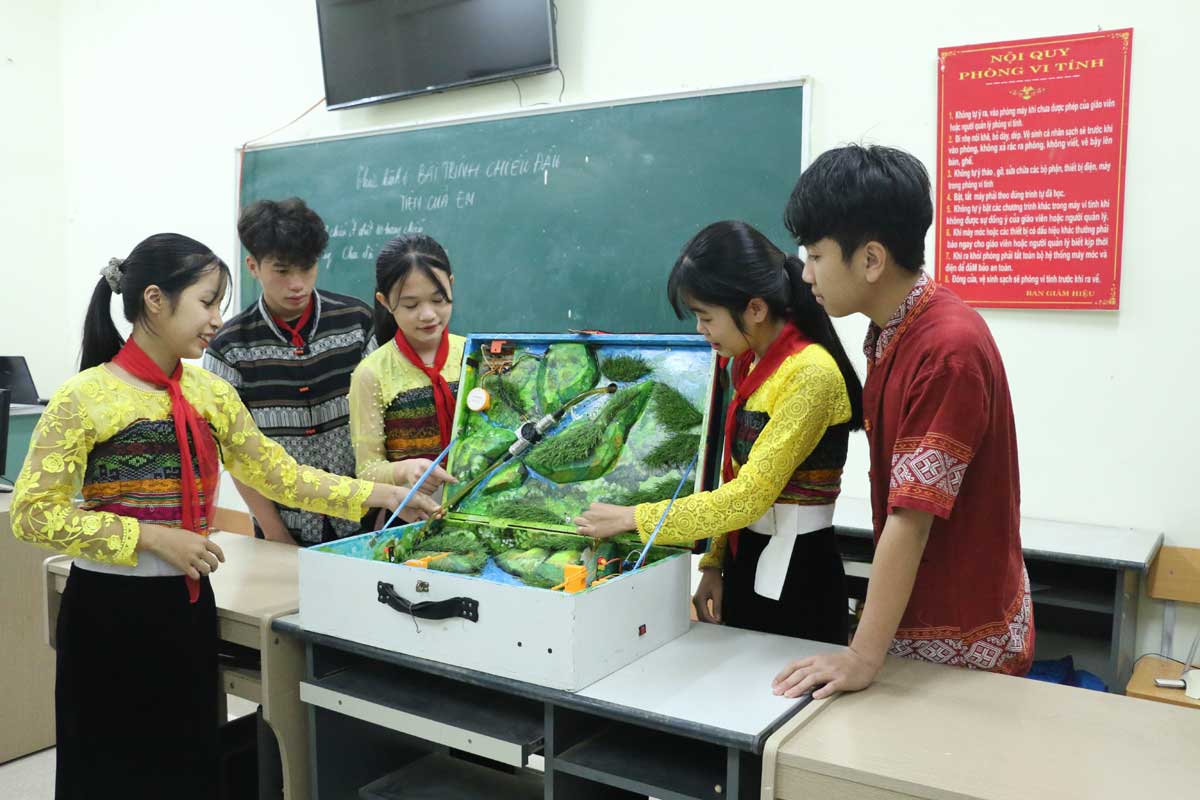
(HBO) – A project on flood and landslide warning developed by a group of Thai ethnic minority students from Hoa Binh won the second prize at an exchange event of programming clubs nationwide hosted by the Dariu Foundation in the Central Highlands province of Lam Dong. The pupils are from the Na Phon primary and secondary school in Mai Chau district’s Na Phon commune.
 A project on flood and landslide
warning by a group of Hoa Binh students from the Na Phon primary and secondary
school wins the second prize at an exchange event of programming clubs
nationwide hosted by the Dariu Foundation.
A project on flood and landslide
warning by a group of Hoa Binh students from the Na Phon primary and secondary
school wins the second prize at an exchange event of programming clubs
nationwide hosted by the Dariu Foundation.
According
to ninth grader Ha Thi Thu Huong, a member of the group, the transport system
in mountainous Na Phon commune include special bridges crossing streams, which
are often hit by unexpected floods during the rainy season.
Unexpected
floods and landslides have caused accidents and damage to both people and their
vehicles, she said.
"From
the fact and with support from our teachers, we came up with the idea and worked
to translate it into reality in hope of reducing damage caused by natural
disasters in mountainous areas,” Huong noted.
When
it is raining hard, a flood is quick to form on a stream. It is also very
difficult to predict when the flood hits the bridge crossing it. Therefore, the
pupils built a flood warning model, which places a flow sensor about 2km away
from these risky bridges.
Ha
Manh Hung, another member of the group, said the sensor will send signals to a
microprocessor that turns on lights of different colours – green for normal
passing, yellow for restricted passing, and red for stop. When the red light is
turned on, a bar will be pulled down. The system uses solar energy and rechargeable
batteries.
Based
on the same principles, the group studied to put sensors at areas with a high
risk of landslides. When the danger is near, the system will send signals via
lights or loudspeakers to alert nearby residents.
During
their implementation of the project, the pupils faced myriad difficulties. They
are all from an ethnic minority and disadvantaged backgrounds. Owning no
computers at home, they had to carry out all of their researches at school.
They also encountered challenges purchasing needed equipment.
Their
success despite difficulties will contribute to encouraging local students,
particularly ethnic minorities, to engage in scientific and technological
research and innovation./.
The Standing Board of the Hoa Binh provincial Party Committee has agreed in principle on a proposal by the Standing Board of the Party Committee of Hoa Binh city to gather feedback on the city’s 1:2000 zoning plan, which forms part of its broader urban development strategy.
Hoa Binh province has made notable progress in public administration reform and digital government development, with the satisfaction index among citizens and businesses reaching over 84%, according to recent government evaluations.
Thanks to great efforts by local authorities in recent times, the governance and public administration performance of Mai Chau district has been significantly improved.
In the afternoon of June 6, the Party Committee, the People's Council, the People's Committee and the Fatherland Front of Lac Son district solemnly held a meeting to celebrate the 139th anniversary of the district's founding (1886–2025) and the 79th anniversary of the establishment of the district's Party Committee (1946–2025). There was the attendance of Mr. Bui Van Thang, the Vice Chairman of the Provincial People's Council; Mr. Quach Tat Liem, the Vice Chairman of the Provincial People's Committee; Ms. Dang Bich Ngoc, the Deputy Head of the National Assembly Delegation of the province; as well as the former leaders of the province and district through various periods, who are the natives of the district.
Implementing the Politburo’s Resolution No. 57-NQ/TW on breakthroughs in science – technology, innovation, and digital transformation is a golden opportunity for the northern mountainous province of Hoa Binh to renew growth model, improve competitive edge and shorten digital gap.
Resolution 57-NQ/TW, issued by the Politburo on December 22, 2024, identifies sci-tech, innovation, and digital transformation as strategic breakthroughs to build a developed and prosperous nation. In Hoa Binh province, this spirit is not just a slogan, it’s being put into action through concrete initiatives that form a "new development triangle”: digital citizenship, digital economy, and digital administration.



 A project on flood and landslide
warning by a group of Hoa Binh students from the Na Phon primary and secondary
school wins the second prize at an exchange event of programming clubs
nationwide hosted by the Dariu Foundation.
A project on flood and landslide
warning by a group of Hoa Binh students from the Na Phon primary and secondary
school wins the second prize at an exchange event of programming clubs
nationwide hosted by the Dariu Foundation.